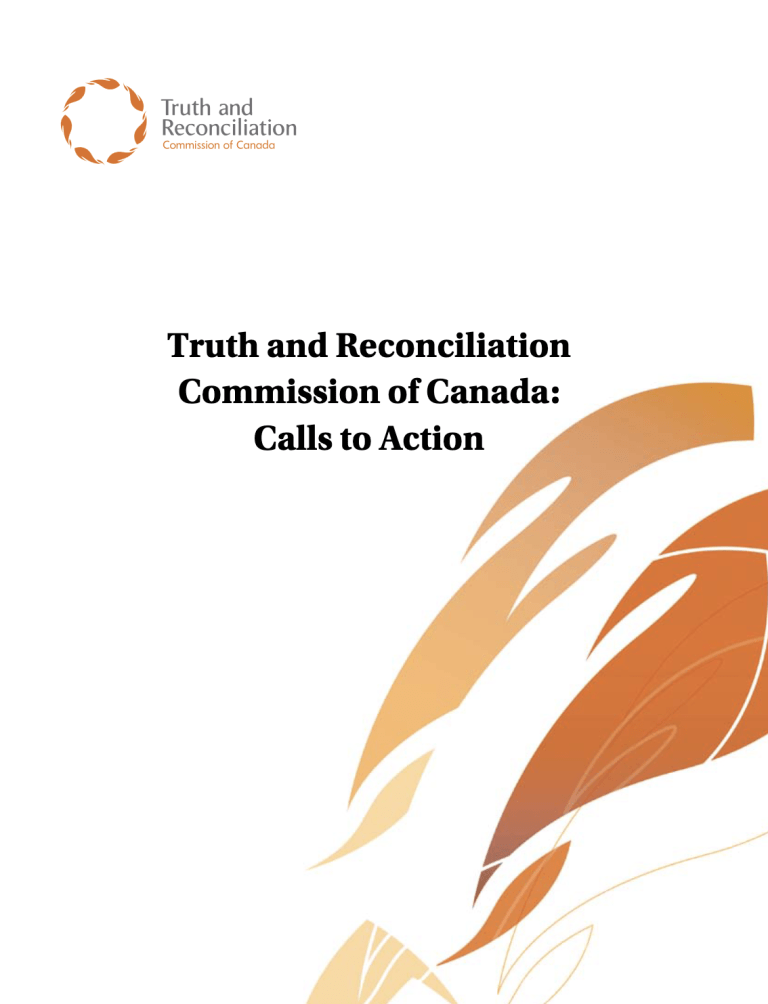31 search results
for
Representation and leadership
Reconciliation
Church apologies and reconciliation
Recommendation 60: We call upon leaders of the church parties to the Settlement Agreement and all other faiths, in collaboration with Indigenous spiritual leaders, Survivors, schools of theology, seminaries, and other religious training centres, to develop and teach curriculum for all student clergy, and all clergy and staff who work in Aboriginal communities, on the need to respect Indigenous spirituality in its own right, the history and legacy of residential schools and the roles of the church parties in that system, the history and legacy of religious conflict in Aboriginal families and communities, and the responsibility that churches have to mitigate such conflicts and prevent spiritual violence.-
Category and theme:
Audience:
Groups affected:
Location of recommendation:
Reconciliation
Church apologies and reconciliation
Recommendation 61: We call upon church parties to the Settlement Agreement, in collaboration with Survivors and representatives of Aboriginal organizations, to establish permanent funding to Aboriginal people for:- Community-controlled healing and reconciliation projects.
- Community-controlled culture- and language revitalization projects.
- Community-controlled education and relationship-building projects. iv. Regional dialogues for Indigenous spiritual leaders and youth to discuss Indigenous spirituality, self-determination, and reconciliation.
-
Category and theme:
Audience:
Groups affected:
Location of recommendation:
Reconciliation
Education for reconciliation
Recommendation 62: We call upon the federal, provincial, and territorial governments, in consultation and collaboration with Survivors, Aboriginal peoples, and educators, to:- Make age-appropriate curriculum on residential schools, Treaties, and Aboriginal peoples’ historical and contemporary contributions to Canada a mandatory education requirement for Kindergarten to Grade Twelve students.
- Provide the necessary funding to post-secondary institutions to educate teachers on how to integrate Indigenous knowledge and teaching methods into classrooms.
- Provide the necessary funding to Aboriginal schools to utilize Indigenous knowledge and teaching methods in classrooms.
- Establish senior-level positions in government at the assistant deputy minister level or higher dedicated to Aboriginal content in education.
-
Category and theme:
Audience:
Groups affected:
Location of recommendation:
Reconciliation
Education for reconciliation
Recommendation 63: We call upon the Council of Ministers of Education, Canada to maintain an annual commitment to Aboriginal education issues, including:- Developing and implementing Kindergarten to Grade Twelve curriculum and learning resources on Aboriginal peoples in Canadian history, and the history and legacy of residential schools.
- Sharing information and best practices on teaching curriculum related to residential schools and Aboriginal history.
- Building student capacity for intercultural understanding, empathy, and mutual respect. iv. Identifying teacher-training needs relating to the above.
-
Category and theme:
Groups affected:
Location of recommendation:
Reconciliation
Education for reconciliation
Recommendation 65: We call upon the federal government, through the Social Sciences and Humanities Research Council, and in collaboration with Aboriginal peoples, post-secondary institutions and educators, and the National Centre for Truth and Reconciliation and its partner institutions, to establish a national research program with multi-year funding to advance understanding of reconciliation.-
Category and theme:
Audience:
Groups affected:
Location of recommendation:
Reconciliation
Museums and archives
Recommendation 67: We call upon the federal government to provide funding to the Canadian Museums Association to undertake, in collaboration with Aboriginal peoples, a national review of museum policies and best practices to determine the level of compliance with the United Nations Declaration on the Rights of Indigenous Peoples and to make recommendations.-
Category and theme:
Groups affected:
Location of recommendation:
Reconciliation
Missing children and burial information
Recommendation 73: We call upon the federal government to work with churches, Aboriginal communities, and former residential school students to establish and maintain an online registry of residential school cemeteries, including, where possible, plot maps showing the location of deceased residential school children.-
Category and theme:
Groups affected:
Location of recommendation:
Reconciliation
Missing children and burial information
Recommendation 74: We call upon the federal government to work with the churches and Aboriginal community leaders to inform the families of children who died at residential schools of the child’s burial location, and to respond to families’ wishes for appropriate commemoration ceremonies and markers, and reburial in home communities where requested.-
Category and theme:
Groups affected:
Location of recommendation:
Reconciliation
Missing children and burial information
Recommendation 75: We call upon the federal government to work with provincial, territorial, and municipal governments, churches, Aboriginal communities, former residential school students, and current landowners to develop and implement strategies and procedures for the ongoing identification, documentation, maintenance, commemoration, and protection of residential school cemeteries or other sites at which residential school children were buried. This is to include the provision of We call upon the federal government to work with provincial, territorial, and municipal governments, churches, Aboriginal communities, former residential school students, and current landowners to develop and implement strategies and procedures for the ongoing identification, documentation, maintenance, commemoration, and protection of residential school cemeteries or other sites at which residential school children were buried. This is to include the provision of appropriate memorial ceremonies and commemorative markers to honour the deceased children.-
Category and theme:
Audience:
Groups affected:
Location of recommendation:
Reconciliation
Missing children and burial information
Recommendation 76: We call upon the parties engaged in the work of documenting, maintaining, commemorating, and protecting residential school cemeteries to adopt strategies in accordance with the following principles:- The Aboriginal community most affected shall lead the development of such strategies.
- Information shall be sought from residential school Survivors and other Knowledge Keepers in the development of such strategies.
- Aboriginal protocols shall be respected before any potentially invasive technical inspection and investigation of a cemetery site.
-
Category and theme:
Groups affected:
Location of recommendation:
